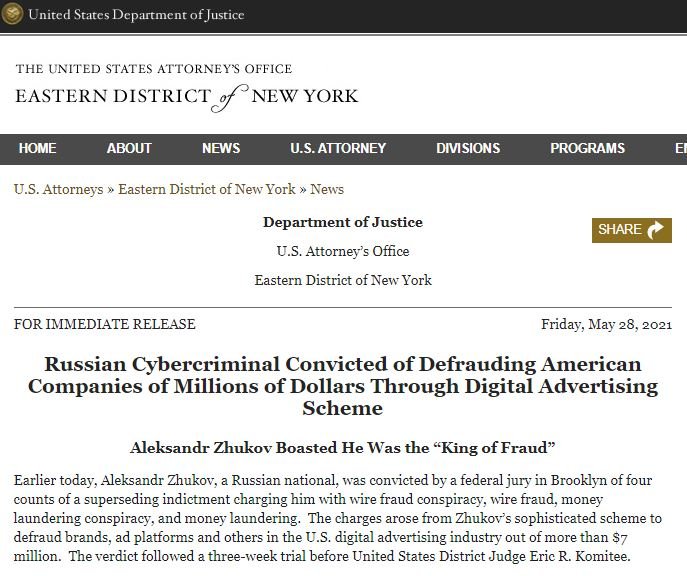The US Department of Justice (DOJ) announced that Aleksandr Zhukov, a 41-year-old Russian citizen, faces a sentence of up to 20 years in prison when accused of operating the advertising fraud scheme identified as Methbot, which reportedly reported to the defendant and his accomplices incomes of up to $ 7 million USD. The self-appointed “King of Fraud” was arrested at the end of 2018 while hiding in Bulgaria and was extradited to the United States a couple of months later.
According to Dzmitry Naskavets, who provides legal assistance services to Russian-speaking people in the U.S., he released some details of the trial: “In most cases like this the defendants plead guilty; Zhukov decided not to cooperate and even declined the possibility of receiving my advice.” Naskavets adds that the defendant claims to have developed an artificial intelligence tool for business administration and even asked the judge responsible for the case to be assigned a new lawyer.

Zhukov’s allegations were unsuccessful, as the jury found him guilty of the four counts brought by the prosecution (wire fraud, conspiracy to commit fraud, money laundering, and transaction transaction with resources of illicit origin).
For his part, New York District Attorney Mark Lesko said, “The defendant is a con man who employed advanced technology to steal millions of dollars from various U.S. companies. Perhaps Zhukov believed he would get away with it, but the US Government has again shown its ability to bring cybercriminals to justice.”
On Zhukov’s fraudulent tactics, court documents state that the defendant used a massive botnet to create an ad network known as Media Methane to place ads on websites in exchange for a very attractive fee; instead of redirecting users to legitimate e-commerce websites, these ads led to malicious pages for various purposes.
The defendant allegedly programmed the servers to simulate human activity on the Internet; for example, when browsing the Internet, they would scroll down a web page and start and stop video players. Zhukov also rented more than 650k IP addresses and recorded them in the name of large telecommunications companies to make it look like computer traffic came from residential homes.
The scheme faked billions of ad views and diverted more than $7 million USD from companies that believed their ads were being viewed by real users. Victims included The New York Times, The New York Post, Comcast, Nestlé Purina and Time Warner Cable.
To learn more about information security risks, malware variants, vulnerabilities and information technologies, feel free to access the International Institute of Cyber Security (IICS) websites.

He is a well-known expert in mobile security and malware analysis. He studied Computer Science at NYU and started working as a cyber security analyst in 2003. He is actively working as an anti-malware expert. He also worked for security companies like Kaspersky Lab. His everyday job includes researching about new malware and cyber security incidents. Also he has deep level of knowledge in mobile security and mobile vulnerabilities.











